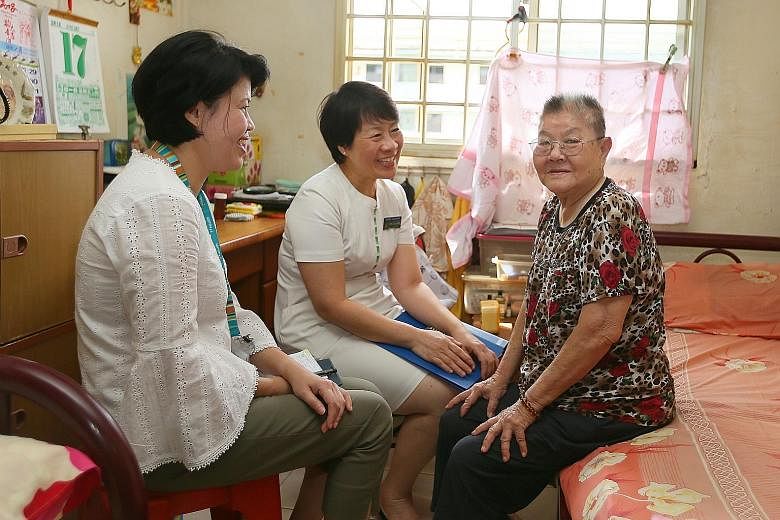More hospitals are scaling up their post-discharge programmes to ensure that patients continue to receive proper medical care at home.
The National University Health System (NUHS) has roped in nurses from National University Hospital to train non-health-care professionals to provide home care under a programme that started last year.
The target this year is to train 20 people in tasks such as toileting, lifting and transferring, and issuing medication reminders for discharged patients and others in the community who require such help.
NUHSis doing this in partnership with Caregiving Welfare Association under the Community Cradle initiative.
Khoo Teck Puat Hospital (KTPH) plans to pilot telehealth services in the second-quarter of the year as part of its current post-discharge, nurse-led home visit service.
The services include video consultations for medically stable patients whose chronic conditions need reviewing, and remote monitoring of vital signs for congestive heart failure or diabetes patients who are at risk of recurrent admissions or need closer monitoring.
The expansion of services has been spurred by the success of current post-discharge programmes.
A trial involving NUH's transitional care programme, which includes a hotline service on weekdays, helped 270 heart failure patients slash the number of times they would have had to be readmitted by 30 to 50 per cent.
KTPH was able to help 746 patients cut the average number of hospital admissions by 18 per cent and the average number of accident and emergency visits by 38 per cent between April and June last year, six months after they signed up for the programme.
Tan Tock Seng Hospital will change its current post-discharge programme to a place-based care model, which looks after patients in a specific geographic area together with community and primary care partners. Its spokesman declined to give more details at this stage.
These initiatives to keep discharged patients out of hospital are a boon for the elderly.
Madam Tan Sok Ngo, 78, was in and out of Singapore General Hospital (SGH) eight times within five months in 2016 due to complications from multiple chronic conditions. The widow, whose husband died eight years ago, lives in a one-room rental flat and has an 84-year-old flat mate.
To help patients like Madam Tan, a team from SGH and social enterprise NTUC Health came up with a simple but effective solution.
A nurse and social worker visit the patient on the day she is discharged to make sure she is well settled at home. The social worker and a volunteer make more home visits to check on the patient.
Thanks to this scheme, Madam Tan has not had to be readmitted.
"I'm very happy that they come to see me and they treat me very well," said Madam Tan, who stopped working as a coffee shop assistant two years ago.
The pilot scheme, which will be expanded to 20 more patients from SingHealth institutions, is part of a person-centred care approach called Esther Network Singapore.
It is modelled after a similar programme pioneered in Sweden.
The network is part of a larger programme called Communities of Care, which looks after continuing and community care in the SingHealth Regional Health System.
"One of the concerns for person-centred care is to provide safety... paying attention to what truly matters to the person and recognising that he or she should be involved in self-care as early as possible," said Ms Esther Lim, the network's coordinator and assistant director of the SingHealth Office of Regional Health.
She added that Singapore's rapidly ageing population and the "unprecedented" increase in healthcare costs also spurred this change in approach to care.
Correction note: In an earlier version of this story, we referred to the Caregiving Welfare Association by another name.


